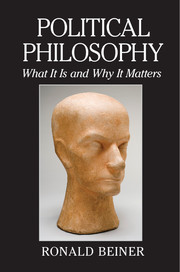Book contents
- Frontmatter
- Dedication
- Contents
- First Prologue: Horizons of Political Reflection
- Second Prologue: Freud, Weber, and Political Philosophy
- 1 Hannah Arendt: The Performativity of Politics
- 2 Michael Oakeshott: Life’s Adventure
- 3 Leo Strauss: The Politics of Philosophy
- 4 Karl Löwith: In Awe of the Cosmos
- 5 Excursus on Nature and History in the Strauss-Löwith Correspondence
- 6 Eric Voegelin: Modernity’s Vortex
- 7 Simone Weil: The Politics of the Soul
- 8 Hans-Georg Gadamer: Philosophy without Hubris
- 9 Jürgen Habermas: Politics as Rational Discourse
- 10 Michel Foucault’s Carceral Society
- 11 Alasdair MacIntyre: Fragmentation and Wholeness
- 12 Short Excursus on the Rise and Decline of Communitarianism as a Political Philosophy
- 13 John Rawls and the Death of Political Philosophy
- 14 Richard Rorty: Knocking Philosophy off Its Pedestal, or the Death of Political Philosophy Postmodernized
- Epilogue: On Not Throwing in the Towel
- Index
- References
11 - Alasdair MacIntyre: Fragmentation and Wholeness
Published online by Cambridge University Press: 05 August 2014
- Frontmatter
- Dedication
- Contents
- First Prologue: Horizons of Political Reflection
- Second Prologue: Freud, Weber, and Political Philosophy
- 1 Hannah Arendt: The Performativity of Politics
- 2 Michael Oakeshott: Life’s Adventure
- 3 Leo Strauss: The Politics of Philosophy
- 4 Karl Löwith: In Awe of the Cosmos
- 5 Excursus on Nature and History in the Strauss-Löwith Correspondence
- 6 Eric Voegelin: Modernity’s Vortex
- 7 Simone Weil: The Politics of the Soul
- 8 Hans-Georg Gadamer: Philosophy without Hubris
- 9 Jürgen Habermas: Politics as Rational Discourse
- 10 Michel Foucault’s Carceral Society
- 11 Alasdair MacIntyre: Fragmentation and Wholeness
- 12 Short Excursus on the Rise and Decline of Communitarianism as a Political Philosophy
- 13 John Rawls and the Death of Political Philosophy
- 14 Richard Rorty: Knocking Philosophy off Its Pedestal, or the Death of Political Philosophy Postmodernized
- Epilogue: On Not Throwing in the Towel
- Index
- References
Summary
Alasdair MacIntyre is a thinker who belongs on any list of the leading critics of modernity of the last half-century. In previous chapters, we have canvassed several of the other thinkers who belong on such a list, but MacIntyre’s critique is significantly different from theirs and it is important to understand what distinguishes him as a critic of modernity and see what themes are characteristic of his distinctive mode of theorizing. As between Arendt’s emphasis on freedom and Strauss’s emphasis on virtue, MacIntyre clearly sides with Strauss, but he would have no interest in or patience with Strauss’s esotericist (i.e., Averroist) view of religion, and while MacIntyre does not favor egalitarianism over hierarchy in all respects (he is after all a committed Catholic), hierarchy, for him, is so to speak hierarchy in the service of egalitarianism, which is not at all the case for Strauss. Like both Arendt and Strauss (Voegelin too), MacIntyre offers a very ambitious historical meta-narrative, leading from virtuous antiquity to corrupt modernity (or in Arendt’s case, I guess, leading from free antiquity to slavish modernity). Much of the force of MacIntyre’s theorizing flows from the actual details of his meta-narrative, which (like Strauss’s and Voegelin’s) largely consists in powerful interpretations of great thinkers in the history of philosophy; as for Strauss, the history of our moral decline is traceable principally via a story of decline etched in the sequence of epic thinkers from Plato and Aristotle onward. For MacIntyre, Aristotelian ethical theory is more or less perfected in Aquinas, and the moral theories spawned during the Enlightenment, which for us tend to be seen as intellectually and morally authoritative, MacIntyre sees as a mere battleground of moral conflict and moral incoherence. We don’t have the space to work our way through all the details of this tale of ethical unraveling (mediated by the history of philosophy); a summary of and brief critical engagement with MacIntyre’s version of neo-Aristotelianism will have to suffice.
- Type
- Chapter
- Information
- Political PhilosophyWhat It Is and Why It Matters, pp. 168 - 188Publisher: Cambridge University PressPrint publication year: 2014

